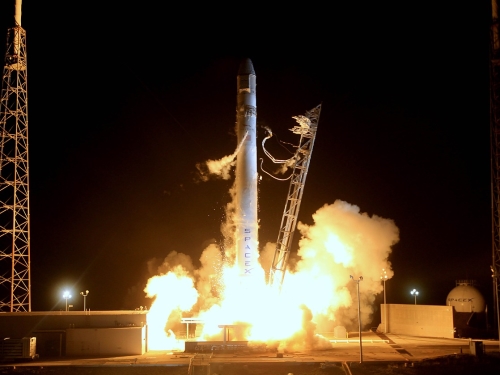
A few weeks ago, Space X’s Falcon 9 rocket carrying an unmanned Dragon capsule destined for the International Space Station (ISS) exploded. The explosion was likely caused by a failed strut. In October of last year, Orbital Sciences had a rocket destined for the ISS explode for unrelated reasons, just after they were awarded a $1.9 billion contract with NASA. In the wake of these incidents, it may be time to assess the implications of private sector involvement in state-sponsored space programs.
Over the past few years, private companies such as Space X and Virgin Galactic have been hailed as the new major players in space. Indeed, they are effectively changing how space exploration is conducted and how related technology is developed and implemented. From an operational point of view, private companies are able to implement decisions and fund projects much faster than most governments can.
These companies have been able to complete missions that only governments had been able to previously, and have garnered major contracts with NASA. But although this takes pressure off of governments and introduces a more competitive environment for space-related innovation, outsourcing government projects can lead to complications, or at the very least, a shift in how space exploration is conducted.
The most cited benefit of the shift to private space exploration is cost. These companies must bid for NASA contracts, which lowers the taxpayer cost of these missions, as some research and development R&D costs are absorbed by the company. Governments and private companies also function differently in terms of the different interest groups to whom they are responsible. NASA is beholden to the government and the taxpayer, while private companies must deal with a more complex web of investors/shareholders, the bottom line, and the need to keep a secure contract. Yet with these benefits, there are new challenges that must be addressed; perhaps the greatest of which is “what happens when something goes wrong”? Rocket missions and space travel are inherently difficult and risky; it’s only a matter of time before this becomes a bigger issue.
Government space programs are no strangers to failed launches, or to human casualties. In fact, the only space program which has no known casualties to date is China’s. Private companies have yet to amass significant casualties, with the only death occurring during a failed Virgin Galactic test flight in 2014. But because that flight was not part of a mission to the ISS and was not tied to any government contract, the implications were different. If an astronaut from NASA were killed in a launch orchestrated by a private company, there may be far-reaching effects both for NASA and for the company in question.
As aforementioned, governments are most likely not held accountable to the same degree as private companies are, as a government can control to some degree how transparent it wants to be. Furthermore, because there were no alternatives to government space programs, accidents were seen to some degree as par for the course. For instance, while the Challenger and Columbia disasters affected NASA’s operations (including an over two year hiatus form launching shuttles), it did not halt the space program. By comparison, private companies actually have a far more difficult set of issues to face in the case of a mishap. In a worst case scenario, a private company could make an easy scapegoat if ever a government’s legitimacy were to be threatened due to a mishap.
So far, Space X has had a practically flawless track record: under contract with NASA, it has already made seven trips to the ISS. NASA has a strong vested interest in these companies, even geopolitically speaking, as they end the Russian monopoly in supplying the ISS. Space X plans on sending humans to space in 2017, and NASA has publicly said that this last incident will not hinder that goal.
So far, so good. While these companies remain private, they still have to answer to their investors, and to governments, but otherwise have quite a large amount of freedom. What will happen when they go on the market? Overnight, the company would have to answer to its shareholders and function in a very different dynamic. The bottom line for a company is arguably more intensely scrutinized than where a government is investing its tax dollars. Given the benefits of private space exploration, it would behoove the government to stand behind such companies when things do go wrong. Whether in the form of subpar profits or launch explosions, the government should remain supportive of these companies. Either way, the shift to using private companies is well underway, and both companies and governments have a lot to gain from such a partnership. Still, it is important to forsee the change in dynamic that will undoubtedly occur once the going gets tough.
Prof. Nayef Al-Rodhan is an Honorary Fellow at St Antony’s College, University of Oxford, UK, and Senior Fellow and Head of the Geopolitics and Global Futures Programme at the Geneva Centre for Security Policy, Switzerland. He is the author of Meta-Geopolitics of Outer Space: An Analysis of Sapace Power, Security and Governence (Basingstoke:Palgrave Macmillan 2012). Additional publications can be found at www.sustainable-history.com

This work is licensed under a Creative Commons Attribution-NonCommercial-NoDerivatives 4.0 International License
For more information on issues and events that shape our world, please visit ISN Security Watch or browse our resources.

